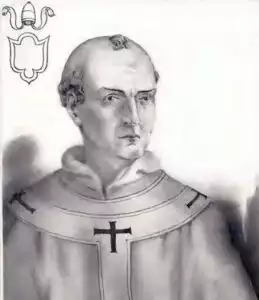
Pope Adrian II, born in Rome around 792 and passing in 872, served as the head of the Catholic Church and ruler of the Papal States from 867 until his death. Not canonized as a saint, Adrian II’s pontificate was marked by significant ecclesiastical and political developments, reflecting a period of considerable turmoil and transition within the Church and Europe.
Early Life and Ecclesiastical Ascent
Adrian II’s early life, shrouded in the mists of history, commenced in the heart of Rome, where he was born into a noble family. His upbringing, deeply embedded in the rich tapestry of Roman ecclesiastical tradition, set the stage for his eventual rise within the Church’s hierarchy. As a young cleric, Adrian demonstrated a profound commitment to the spiritual and administrative duties entrusted to him, a dedication that did not go unnoticed by his superiors.
Ascending through the ecclesiastical ranks, Adrian II’s career was a testament to his enduring devotion and astute leadership skills. Prior to his papacy, he held various significant positions within the Church, each role further honing his abilities in spiritual guidance and church governance. His reputation as a learned and pious clergyman grew, paralleling his rise in ecclesiastical status.
The Papacy and its Challenges
Elected to the papacy in 867, Adrian II ascended to the throne of St. Peter at a time of profound complexities both within and beyond the Church’s dominion. His pontificate was inaugurated amidst a backdrop of political strife and religious uncertainty, challenges that would come to define his tenure as Pope.
Adrian II’s papacy was particularly noteworthy for its dealings with the ongoing conflicts involving the Frankish Empire and the Byzantine Church. He navigated these turbulent waters with a diplomatic acumen that sought to balance the intricate web of political and religious interests. His efforts were not only confined to external affairs; within the Church, he faced the daunting task of maintaining doctrinal unity and discipline in an era fraught with theological disputes and disciplinary laxity.
The Pope’s approach to these challenges was characterized by a blend of firmness and conciliation, a reflection of his deep understanding of the nuanced dynamics at play. He endeavored to steer the Church through this tumultuous period with a vision that was both pragmatic and rooted in the spiritual and moral tenets of Christianity.
Religious and Diplomatic Endeavors
Under Adrian II’s guidance, the Church embarked on a mission to strengthen its religious and moral authority. He emphasized the need for moral rectitude among the clergy, advocating for a life of piety and discipline. His commitment to religious orthodoxy was evident in his dealings with various theological controversies that emerged during his papacy. Notably, he presided over the Eighth Ecumenical Council in 869, which addressed the issue of iconoclasm and sought to bridge divisions between the Western and Eastern Churches.
Adrian’s diplomatic endeavors were equally significant. He maintained a delicate balance between the Frankish Empire and the Byzantine Empire, navigating the complex political landscape with a deft understanding of the nuances involved. His papacy saw the strengthening of ties with Western rulers, while also reaching out to the Eastern Church in an attempt to heal longstanding rifts.
Legacy and Impact
Adrian II’s pontificate left an indelible mark on the history of the Papacy and the wider Christian world. His tenure, though fraught with challenges, was characterized by a steadfast commitment to the spiritual welfare of the Church and its faithful. His diplomatic skills helped maintain a semblance of unity in an age marked by political and religious fragmentation.
His legacy is a testament to the resilience and adaptability of the Papacy during a period of significant transition. Adrian II’s efforts in maintaining church discipline, upholding doctrinal integrity, and navigating complex political realities underscored the multifaceted role of the Pope as a spiritual leader and a diplomatic figure.
Pope Adrian II’s life and papacy were emblematic of a period of profound change and challenge in the history of the Church. His contributions, marked by a blend of spiritual dedication and diplomatic skill, have left a lasting impact on the Catholic Church’s trajectory. His leadership during a time of turmoil and transition highlights the enduring significance of the Papacy in shaping the course of Christian history.
________________________________________
References
- “Adrian II.” Britannica. Accessed December 19, 2023.
- “Adrian II.” Pantheon. Accessed December 19, 2023.
- “Pope Adrian II.” British Museum. Accessed December 19, 2023.
- “Pope Adrian II.” Pope History. Accessed December 19, 2023.
- “The Eighth Ecumenical Council.” Legion of Mary Tidewater. Accessed December 19, 2023.
